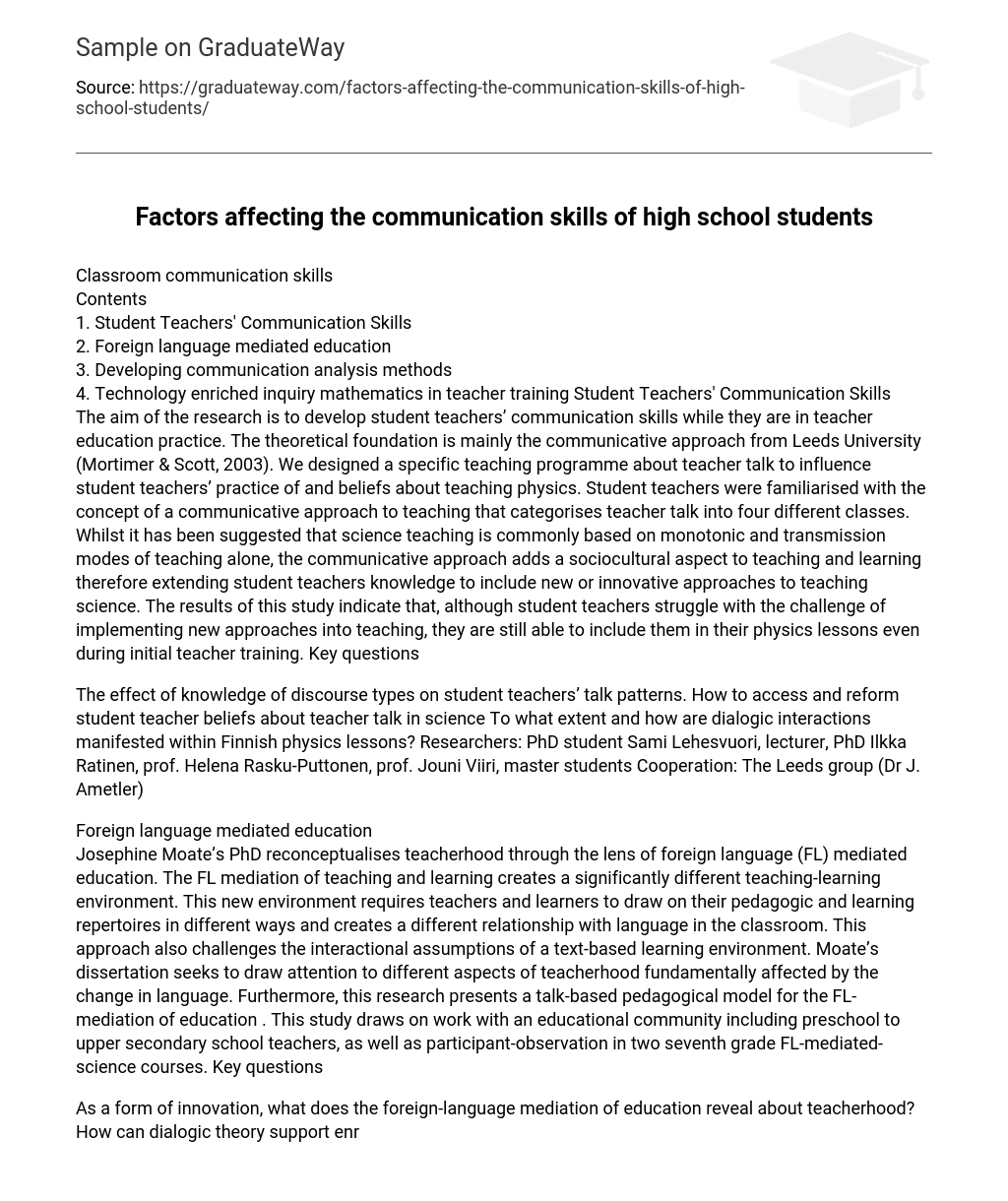Classroom communication skills
Contents
1. Student Teachers’ Communication Skills
2. Foreign language mediated education
3. Developing communication analysis methods
4. Technology enriched inquiry mathematics in teacher training Student Teachers’ Communication Skills
The aim of the research is to enhance the communication skills of student teachers during their teacher education practice. The research is mainly based on the communicative approach from Leeds University (Mortimer & Scott, 2003). A specific teaching program was developed to influence student teachers’ practice and beliefs about teaching physics. Student teachers were introduced to the communicative approach, which classifies teacher talk into four different categories. While science teaching often relies on monotonic and transmission modes alone, the communicative approach incorporates a sociocultural aspect, expanding student teachers’ knowledge of innovative approaches to teaching science. The findings suggest that although student teachers face challenges in implementing new approaches, they are still able to incorporate them into their physics lessons even at the early stage of their teacher training.
Key questions
The study focuses on the impact of understanding different types of discourse on the way student teachers communicate. It also explores methods for accessing and changing student teachers’ beliefs about how teachers should speak in science subjects. The research team includes PhD student Sami Lehesvuori, PhD lecturer Ilkka Ratinen, and professors Helena Rasku-Puttonen and Jouni Viiri, as well as master students. The project involves collaboration with the Leeds group, led by Dr J. Ametler.
Foreign language mediated education is the main focus of Josephine Moate’s PhD research. She redefines the concept of teacherhood by examining how teaching and learning are influenced by the use of foreign languages. This form of mediation creates a unique environment that necessitates teachers and learners to adapt their teaching and learning strategies. It also changes the dynamics of language use in the classroom, challenging traditional text-based interactions. Moate’s dissertation aims to shed light on the various aspects of teacherhood that are profoundly impacted by this linguistic shift. Additionally, her study proposes a pedagogical model that emphasizes communication for foreign language mediated education. The research was conducted with a diverse educational community, involving teachers from preschool to upper secondary school levels, as well as participant-observation in two seventh-grade science courses taught using foreign languages. The study raises important questions about this innovative approach to education.
PhD researcher Josephine Moate explores the foreign-language mediation of education as a form of innovation. By examining this aspect, she aims to reveal insights about teacherhood. Additionally, she investigates how dialogic theory can contribute to a deeper understanding of teacherhood based on these findings.
Cooperation: Jyväskylä CLIL Cascade
Developing communication analysis methods
In line with socio-cultural theory, the integration of teaching, learning, and discourse creates a complex system. By investigating discourse in teaching and learning, we can examine the relationship between these three aspects of meaning construction. Learning is a time-bound process that occurs through dialogue. Therefore, studying dialogue over time is necessary to understand how learning takes place and the resulting learning outcomes. This allows us to observe the communicative practices of teachers and students, as well as the changes in participation and communicative patterns in the classroom. A successful learning environment requires continuity in discourse. Time-based classroom discourse analysis is a new field within socio-cultural classroom discourse analysis and forms the main focus of this study. It is based on Viiri and Saari (2007) and Niina Nurkka’s PhD thesis. Through the temporal analysis of classroom discourse, we aim to characterize aspects such as continuity and cumulation of discourse.
Key questions:
How can the nature, purposes, and rhythm of classroom discourse be characterized? How can cumulative science teaching be described?
What is the relationship between the nature of discourse and the topic (content) being discussed? Researchers include Post doc Niina Nurkka, PhD Sami Lehesvuori, and Jouni Viiri. Collaboration includes The Leeds group (Dr. J Amettler), Lyon group (Prof. Andrée Tiberghien), and Open University (Prof. Karen Littleton). The focus is on technology-enriched inquiry mathematics in teacher training.
There is a consensus that effective teaching methods in mathematics focus on the student, promote interaction, challenge students to explore non-routine tasks in mathematics, and incorporate appropriate technology. This approach is known as inquiry mathematics and has been shown to enhance learning according to previous studies. However, teachers require support when implementing this teaching method. This research aims to investigate how prospective secondary and post-secondary mathematics teachers incorporate technology-enhanced inquiry mathematics. The study involved 29 prospective teachers who were educated on the principles of inquiry mathematics and introduced to GeoGebra software. They were then instructed to implement an inquiry mathematics lesson. Data was primarily collected through video recordings of these lessons and interviews with the teachers. The data collection period was between 2010 and 2012.
Researcher: Lecturer Markus Hähkiöniemi
Researchers: Lecturer
Collaborators: Prof. Jouni Viiri, Dr. Henry Leppäaho, Dr. Kauko Hihnala and master students, Prof. John Francisco (University of Massachusetts, Amherst), Dr. Antti Viholainen (University of Eastern Finland)





